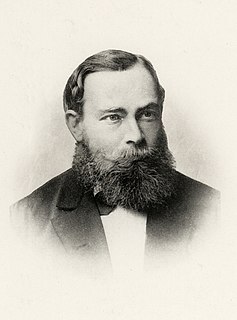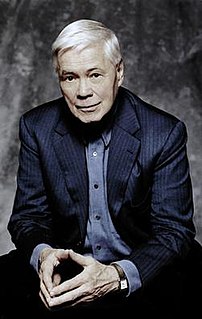Ein Zitat von Tom Robbins
Können Sie nicht verstehen, dass die Romantik ebenso wenig ein Feind der Wissenschaft ist wie die Mystik? Tatsächlich sind Romantik und Wissenschaft gut füreinander. Der Wissenschaftler hält den Romantiker ehrlich und der Romantiker hält den Wissenschaftler menschlich.
Verwandte Zitate
Nun ist der grundlegende Impuls hinter dem Existentialismus optimistisch, ganz ähnlich wie der Impuls hinter jeder Wissenschaft. Existenzialismus ist Romantik, und Romantik ist das Gefühl, dass der Mensch nicht das ist, für das er sich immer gehalten hat. Die Romantik begann als ein gewaltiger Aufschwung des Optimismus hinsichtlich der Statur des Menschen. Ihr Ziel – wie auch das der Wissenschaft – bestand darin, den Menschen über die wirren Gefühle und Impulse seines alltäglichen Menschseins zu erheben und ihn zu einem gottähnlichen Beobachter der menschlichen Existenz zu machen.
„Fakten, Fakten, Fakten“, ruft der Wissenschaftler, wenn er die Notwendigkeit einer soliden Grundlage der Wissenschaft betonen will. Was ist eine Tatsache? Eine Tatsache ist ein Gedanke, der wahr ist. Aber der Wissenschaftler wird sicherlich nicht erkennen, dass etwas, das von den unterschiedlichen Geisteszuständen der Menschen abhängt, die feste Grundlage der Wissenschaft ist.
„Moderne“ Poesie ist im Wesentlichen eine Erweiterung der Romantik; sie ist das, was die romantische Poesie zu werden wünscht oder für notwendig hält. Sie ist das Endprodukt der Romantik, alles Vergangenheit und keine Zukunft; es ist unmöglich, durch irgendeine Extrapolation weiter zu gehen Der Prozess, durch den wir angekommen sind, und sicherlich ist es unmöglich, dort zu bleiben, wo wir sind. Wer könnte ein Jahrhundert des Übergangs ertragen?
Ich halte es für besonders wichtig, dass der Wissenschaftler eine klare und angemessene Sozialphilosophie hat, sogar noch wichtiger, als der Durchschnittsmensch eine Philosophie haben sollte. Denn es gibt bestimmte Aspekte der Beziehung zwischen Wissenschaft und Gesellschaft, die der Wissenschaftler besser einschätzen kann als jeder andere, und wenn er nicht auf dieser Bedeutung besteht, wird es niemand anderes tun, mit der Folge, dass die Beziehung zwischen Wissenschaft und Gesellschaft verzerrt wird. zum Schaden aller.
Sir Hiram Maxim ist ein echtes und typisches Beispiel für den Mann der Wissenschaft, romantisch, aufgeregt, voller echter, aber einigermaßen offensichtlicher Poesie, ein wenig unklar in Logik und Philosophie, aber voller herzlicher Begeisterung und einer ehrenhaften Einfachheit. Er ist, wie er es ausdrückt, „ein alter und ausgebildeter Ingenieur“ und wie alle alten und ausgebildeten Ingenieure, denen ich zufällig begegnet bin, ein Mann, der sich für die übermenschliche oder unmenschliche Konzentration entschädigt, die für die Naturwissenschaften erforderlich ist vage und gefährliche Romantik über alles andere.
Ich bin kein Wissenschaftler, ich war kein guter Student der Naturwissenschaften, ich habe mich mein ganzes junges Leben lang effektiv von der Wissenschaft entfremdet gefühlt, und erst als ich erwachsen wurde, begann ich, die Kraft der Wissenschaft aus einem ganz anderen Blickwinkel wirklich zu schätzen .
Ich wollte immer Wissenschaftlerin werden. Ich habe eigentlich keine Schriftstellerfreunde. Der Prozess, ein Schriftsteller zu sein, ist viel innerlicher als der eines Wissenschaftlers, weil Wissenschaft so reaktionär ist. Ich denke, dass sich alle forschenden Wissenschaftler als Teil einer großen Tradition betrachten, die auf Arbeiten aufbaut, an denen seit den Anfängen der Wissenschaft selbst gearbeitet wurde. Ich bin mir allerdings nicht sicher, ob Schriftsteller auf die gleiche Weise über sich selbst denken.
Die Bedeutung einer Tatsache ist relativ zum [allgemeinen wissenschaftlichen] Wissen. Zu sagen, dass eine Tatsache in der Wissenschaft von Bedeutung ist, bedeutet, dass sie dazu beiträgt, ein allgemeines Gesetz aufzustellen oder zu widerlegen; Denn obwohl die Wissenschaft von der Beobachtung des Besonderen ausgeht, beschäftigt sie sich im Wesentlichen nicht mit dem Besonderen, sondern mit dem Allgemeinen. Eine Tatsache ist in der Wissenschaft keine bloße Tatsache, sondern ein Beispiel. Darin unterscheidet sich der Wissenschaftler vom Künstler, der, wenn er sich überhaupt dazu herablässt, Tatsachen zu bemerken, sie wahrscheinlich in ihrer ganzen Besonderheit wahrnimmt.





































